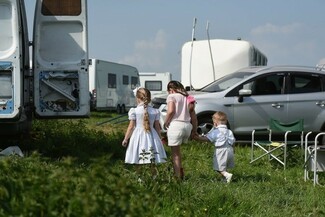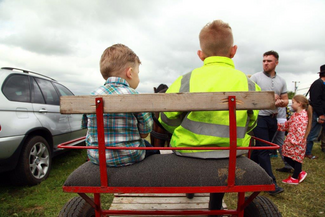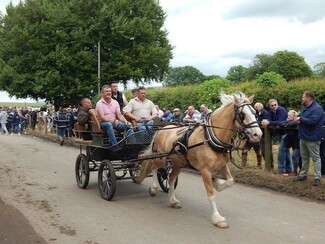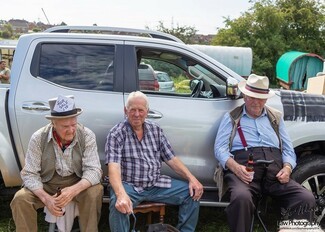“A disaster waiting to happen” - Traveller communities buckling from the impact of the pandemic

Things were bad enough already for Gypsy, Roma and Traveller communities, says Pauline Anderson, chair of The Traveller Movement, but then they got worse. Anderson is talking about a recent documentary, ‘The Truth About Traveller Crime’, which was broadcast by Channel 4 on 16 April.
It suggested that there was a link between the location of some sites and increased crime rates. She tells Liberty Investigates that the aftermath was frightening: “We have received a lot of racially motivated hate comments…saying we should be forcibly sterilised, burned alive in our caravans and other similar comments…it has put race relations back years.” Hundreds of people have complained to Ofcom, the regulator, about the programme, but the hurt remains, that at a time when the communities are facing increased strain because of the pandemic, they have to counter claims of criminality as well. Margaret Greenfields, Professor of Social Policy and Community Engagement at Buckinghamshire New University, said that “those on the roadside, in particular, [are] seen as vulnerable to attack” after the programme went out, adding that there are also “increasing concerns about anxiety, depression and impacts on mental health”.
The multiple pressures, on the communities, including rising rates of unemployment, poor access to healthcare, overcrowded living conditions and hostility, are becoming near intolerable, say elders, parliamentarians and advocates. On the day of the lockdown, families across the UK were given clear guidance about how they should stay at home, protect the NHS and save lives. Soon after the lockdown the Chancellor followed up with comforting news about furloughing people in employment and, later, how the state would also protect the income of self-employed people. Now parliamentarians and community members are calling on the government to urgently give similarly clear guidance to nomadic communities and the insecurely housed Roma population about how they can protect themselves against Covid-19. Community members are saying that they have fallen through the cracks in every way and feel confused, economically stricken and forgotten.

Human rights organisations, including the lobby group, Friends, Families and Travellers (FFT), wrote an urgent letter to government ministers on 24 March, calling for the government to secure access to basic facilities for the estimated 95,000 people living roadside, as well as on authorised sites and boats, who need to self-isolate. In particular the letter asked for an end to evictions, pointed to the lack of sanitation roadside, to the endemic overcrowding on many sites, and of fears that existing health needs would not be met during the pandemic. Homeless families living roadside, of which there are around 10,000, fear eviction, and even if most councils have delayed eviction orders, around a third of the families have very limited access to water and sanitation. Council leisure centres, which are used by those living roadside for showers, are now closed so sanitation is dangerously poor, and access to water refill points are also closed. The co-chairs of the All-Party Parliamentary Group for Gypsies, Traveller and Roma, Kate Green MP and Baroness Whitaker, have also written two letters to the government, asking for urgent public health guidance on matters such as these to be issued to the communities.
On 11 April Stephen Greenhalgh, Minister of State in the Ministry of Housing, Communities and Local Government finally wrote to local authorities across England highlighting how they can support Gypsies and Travellers during the coronavirus pandemic. FFT tells Liberty Investigates that the organisations have still not received a formal response to their letter, but that Greenhalgh did address some concerns around facilities for roadside Travellers, although he did not direct local authorities to halt evictions. By contrast, however, the Scottish and Welsh governments provided clear instructions on halting evictions and what support local authorities should give communities. According to Adrian Jones, of the National Federation of Gypsy Liaison Groups, a small number of authorities in England have evicted families living roadside and a larger number have threatened evictions but stayed them for the time being.
Local authorities seem immobilised by the many tasks devolved onto them by central government. Lucy Hetherington, from FFT, explains some groups, such as van dwellers, report that they have nowhere to go. One van dweller, Primrose, asked her local authority for advice on somewhere to settle during the lockdown, but was told that they had no plans for people in her predicament. She says: “The government has totally failed to identify where [we] can go during the pandemic, potentially pushing us from pillar to post, while at the same time wanting people to not travel.” Hetherington says that local authorities are still enforcing “prohibitive orders to ban Gypsies and Travellers from huge swathes of land by way of Public Space Protection Orders or wide injunctions”.
Hetherington says that authorised sites, where around 75,000 community members live, are under pressure too. Reports from sites describe dangerous living conditions, she says, with many describing “three generations or multiple families living on the same plot” in overcrowded and poorly maintained conditions – bad before the outbreak, but positively risky now, not just from the pandemic, but also from fire. One three-generational family living on a local authority site say that they are unable to leave their own yard, as sewage has leaked across the site. They add that ambulances are unable to access the site as a tree blocked the site before the pandemic and it cannot be cleared. Adrian Jones adds that communities are reporting extreme strain – one family with a member living with Covid-19 says they were forced off their site. A family in very poor health, living on a small site in Derbyshire, asked the Federation for help, after other people tried to move onto their land. Other community members asked the Federation whether their children could continue to play out on sites with children from nearby pitches, as nobody had told them what they could and couldn’t do, if they were related.

The communities feel forgotten and ignored, which led to confusion and lost time at the beginning of the outbreak. Candy Sheridan, the former vice-chair of the representative body, the Gypsy Council, says that sites were slow to shut to relatives visiting, and people are bewildered about the rules on site. “If you are on a private site and all are related, should you be self-isolating just in your trailer?” She adds that attention has focused on overcrowded conditions in townships in other countries where people cannot self-isolate but not here. “What is happening on our overcrowded private and public Gypsy Traveller sites here in the UK?”
The economic impact on communities with high levels of self-employment also seems to be forgotten, as many small businesses owned by Travellers do not fit the government’s criteria. Many Travellers work abroad, and have returned without any secure employment. At the same time utility bills, which are already often more expensive on sites, are increasing as families self-isolate, with families reporting that they are getting into debt. Jones says that many families, who use calor gas for cooking, cannot find it as shops are shut. The Roma Support Group, which speaks for organisations across the country representing the population of some 200,000 community members, is concerned that many, who live in poverty, are now experiencing a disproportionate impact during the pandemic. The group also points to increased hostility against Roma populations. Luton Roma Trust’s Crina Morteanu tells Liberty Investigates that almost all the adults in the 3,000 community are employed on zero hours contracts in factories and retail. They are not covered by the government scheme. Where factories are open they are going to work, frightened of contracting the virus. Those unable to work are sinking into even deeper destitution, with some families now on the brink of eviction.
The effect of Covid-19 on deeply held cultural traditions in the communities is slowly emerging. One well-respected member of the Travelling communities told me that a family member died on the day of the lockdown and adds: “His wife feels that her husband was buried like a dog. We’re from a big family on both sides. We couldn’t sit up with him the night before he was buried, as tradition dictates, and we couldn’t carry his coffin.” The ornate flower displays, and the large number of mourners that would usually attend such a funeral were absent. Thomas Acton, emeritus professor of Romany Studies from the University of Greenwich, tells Liberty Investigates that the communities are devastated by the rules around the virus but respect them. Many bereaved families are adapting their practices, such as sitting up together in permitted numbers the night before burial, without the body of the deceased. They are holding small funerals in the hopes of larger, traditional gatherings once restrictions are eased.
Many feel that it is only a matter of time before the virus sweeps through densely packed sites. Mags Price, who works as a manager with the member led organisation, Leeds Gate, tells me about the conditions on the site where she lives with her family. “We are humans like any other, but we have so little space, our children are crammed into small caravans and have to play out on concrete. It keeps me up at night, worrying, because if one of us got it on the site, we all would.” Price adds that she “tries to look out for the grannies” on the sites managed by Leeds Gate, listing community members recovering from cancer, heart problems, high blood pressure and asthma who she rings to check on their health and offer assistance. Their existing health needs are poor already, but the pandemic has lain bare how fragile the situation is. Sheridan agrees, saying that the communities have higher rates of respiratory disease and cancer than the general population. “A huge worry for families is that treatments will stop and this will impact more on our communities than any other group.”

Helen Jones, director of Leeds Gate, warns that social isolation is practically impossible, despite the community doing all it can to avoid infection. “Too many families are being forced into sharing facilities. Added to the health burden which our families already carry, this is a disaster waiting to happen for some families.”
Channel 4, which broadcast the Dispatches programme, said in a statement: “We stand by the journalism in this programme which examined an important issue that was addressed fairly, accurately, and with due impartiality in accordance with the Ofcom Broadcasting Code. Channel 4 regularly addresses uncomfortable issues and any delay in transmission would have been unfair on the contributors. The statistics were drawn from government and police sources and analysis of the association between crime levels and some Traveller sites was undertaken by highly professional people. The programme included contributions from Travellers and Traveller advocates as well as people who detailed their experiences of living near certain Traveller sites and who questioned the authorities’ approach to criminality. Other representative groups were approached but did not respond or declined to take part in the programme.”
By Katherine Quarmby for Liberty Investigates
This article was first published by Liberty Investigates and their version can be found here - LIBERTY INVESTIGATES